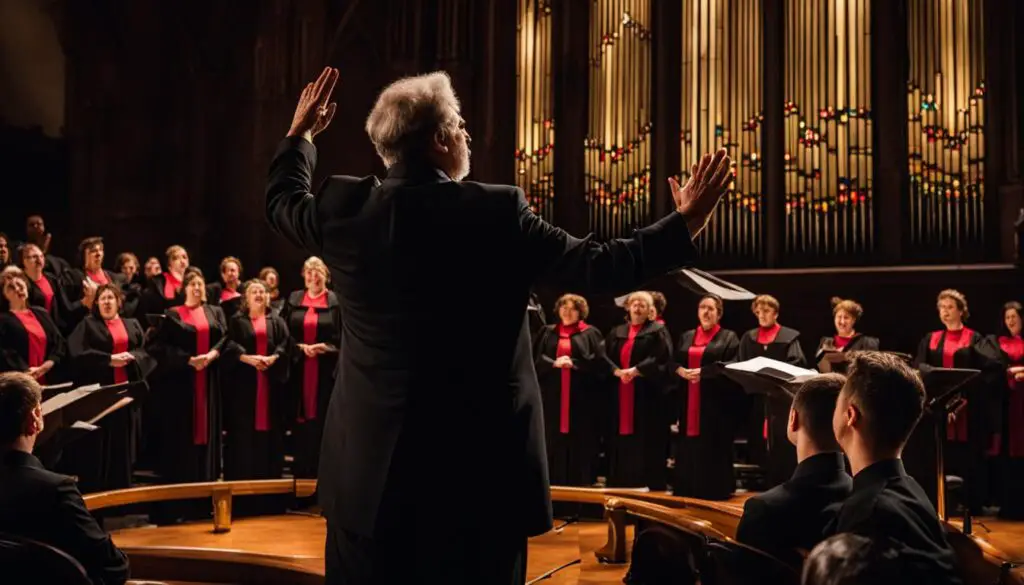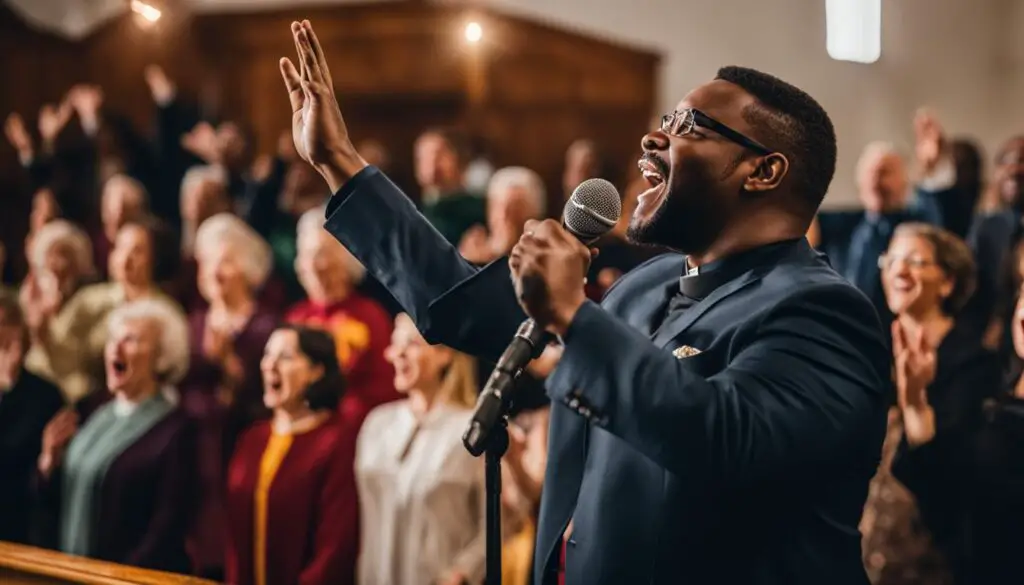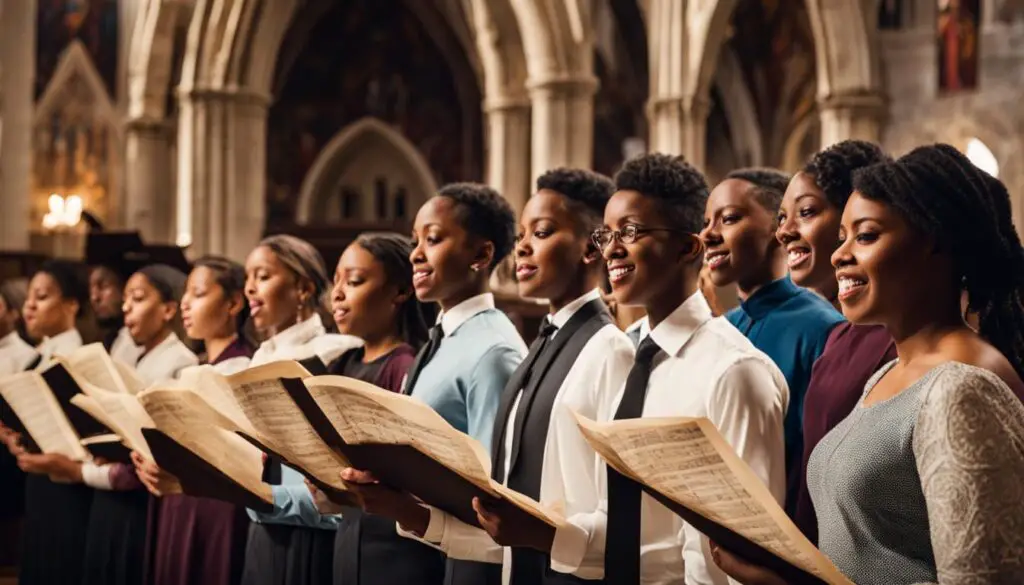Church choirs have the power to transform worship through the beauty of music. Through their engaging activities, they create an atmosphere of Christ-exalting, Spirit-empowered worship that touches the hearts of congregants. Music not only enhances the worship experience but also brings people together in a powerful expression of faith.
Key Takeaways:
- Church choirs inspire responsive and engaged worship through music.
- Choir leadership is important for creating an atmosphere of undistracting excellence.
- Pastor involvement in congregational singing sets the tone for active participation.
- Great songs for congregational singing exult Christ and engage the congregation.
- Cultivating a congregation-centered priority fosters community and involvement.
The Importance of Choir Leadership
Leading a choir is a crucial role that requires both musical skill and effective leadership. While extensive training is not always necessary, it is important to approach choir leadership with intentionality and a desire to cultivate an environment of worship. As a choir leader, your primary goal should be to guide the choir in creating an atmosphere where the focus is on glorifying God through music.
One key aspect of choir leadership is the ability to work with the available talent. Whether you have a small group or a larger ensemble, it’s important to assess the skills and abilities of your choir members. Consider starting with auditions to evaluate their vocal range and musicality. By understanding the strengths and limitations of your choir, you can tailor your arrangements and song choices to create a unified and harmonious sound.
“Choir leadership is not just about musical excellence; it is about creating an ‘undistracting excellence’ that draws attention to the worship of God.”
Effective choir leadership also involves fostering a spirit of worship and engagement among your choir members. Encourage them to actively participate and internalize the lyrics and melodies of the songs. This can be achieved through regular rehearsals, vocal warm-ups, and providing resources for personal practice. By cultivating a culture of excellence and devotion, you can inspire your choir to lead the congregation in heartfelt worship.

The Role of Choir Leadership:
| Key Responsibilities of a Choir Leader | Skills and Qualities |
|---|---|
| Create a worshipful atmosphere | Strong musical abilities |
| Work with available talent | Effective communication |
| Choose appropriate repertoire | Leadership and organizational skills |
| Provide direction and guidance | Passion for worship |
Choir leadership is an important role that requires a combination of musical expertise, leadership skills, and a heart for worship. By embracing these responsibilities and cultivating a culture of worship, you can lead your choir to enhance the worship experience and bring glory to God through music.
Involving the Pastor in Congregational Singing
When it comes to congregational singing, the role of the senior pastor cannot be overstated. The pastor serves as a shepherd, guiding the flock towards a deeper and more meaningful worship experience. By actively engaging in congregational singing, the pastor sets an example for the entire church community.
The pastor’s involvement starts with the selection of songs. It is essential for the pastor to have an active role in choosing the songs that will be sung during worship services. By carefully selecting songs that align with the church’s theological beliefs and resonate with the congregation, the pastor plays a crucial part in shaping the worship experience.
Furthermore, the pastor should personally model the importance of congregational singing. When the congregation sees their pastor wholeheartedly participating in the singing, it encourages their own engagement and creates a sense of unity. The pastor’s visible enjoyment of the congregation’s singing helps foster a joyous and enriching worship environment.
“Congregational singing is not just a performance; it is an act of worship. As pastors, we have the privilege and responsibility to lead our church in this vital aspect of worship. By wholeheartedly embracing congregational singing, we demonstrate our love for God and our desire for the entire congregation to join in exalting Him.”
Creating a thriving relationship between the pastor and the worship leader is also crucial. Regular communication and collaboration between the two ensure a shared vision and a unified approach to congregational singing. Together, they can strategize ways to enhance the worship experience and continually nurture the musical aspect of the church’s worship ministry.

Pastor’s Role in Congregational Worship
| Role | Responsibilities |
|---|---|
| Selection of Songs | Active involvement in choosing songs that align with the church’s theological beliefs and resonate with the congregation. |
| Modeling Congregational Singing | Setting an example for the congregation by actively participating in the singing during worship services. |
| Relationship with Worship Leader | Developing a thriving relationship with the worship leader to ensure a shared vision and unified approach to congregational singing. |
Selecting Great Songs for Congregational Singing
Choosing the right songs for congregational singing is a crucial aspect of creating a vibrant worship experience. Great songs have the power to engage and inspire the congregation, leading them to connect with God on a deeper level. When selecting songs, it’s important to consider a few key factors that contribute to their impact.
Meaningful Lyrics
One of the most important aspects of a great congregational song is its lyrics. The words we sing should exalt Christ, convey biblical truths, and resonate with the hearts of the worshippers. Songs with meaningful lyrics help the congregation to engage intellectually and emotionally, deepening their worship experience. Consider choosing songs that are rich in theological content and reflect the core beliefs of the church.
Enjoyable Melodies
In addition to meaningful lyrics, the melodies of congregational songs should be enjoyable to sing. A catchy and accessible melody makes it easier for the congregation to join in, creating a sense of unity and participation. Aim for melodies that are easy to learn and remember, allowing the congregation to focus on worshipping rather than struggling to follow the music.
A Mix of Tradition and Contemporary
Creating a diverse repertoire of songs is essential for catering to the varied preferences and backgrounds within the congregation. Balance traditional hymns with contemporary worship songs to provide a well-rounded worship experience. Traditional hymns connect us to the rich legacy of the Church, while contemporary worship songs allow for a fresh expression of praise and worship.
| Song Title | Genre | Key Message |
|---|---|---|
| Amazing Grace | Hymn | The beauty of God’s grace and redemption |
| What a Beautiful Name | Contemporary | Exalting the name of Jesus and His saving power |
| How Great Thou Art | Hymn | Recognizing God’s majesty and creation |
| Great Are You Lord | Contemporary | Declaring the greatness and faithfulness of God |
By carefully selecting great songs for congregational singing, churches can create a worship environment that engages the hearts and minds of the worshippers. Meaningful lyrics, enjoyable melodies, and a mix of traditional and contemporary songs all contribute to a vibrant worship experience. So let us choose songs that exalt Christ and lead the congregation into a deeper encounter with God.
Cultivating a Congregation-Centered Priority
Creating a congregation-centered worship environment is an essential aspect of enhancing the overall worship experience. When everyone in the music ministry, from the worship leader to the congregation, prioritizes singing together as an act of worship, it fosters a sense of community and involvement. This shared commitment to congregational singing creates a powerful connection among worshippers as they lift their voices in unified praise.
To cultivate a congregation-centered priority, it is crucial to build a culture where individuals realize their responsibility to actively participate in singing and supporting one another in worship. This involves intentional efforts to encourage congregational engagement and create an atmosphere where everyone feels comfortable and encouraged to join in. It’s not just about having a skilled choir performing for the congregation, but about empowering the congregation to be an integral part of the worship experience.
One effective way to cultivate a congregation-centered priority is by incorporating intergenerational worship elements. When people of all ages come together to worship, it strengthens the sense of community and allows for a diverse range of perspectives and experiences to enrich the music ministry. This can include involving children, youth, and adults in various aspects of the worship service, such as leading songs, sharing testimonies, or participating in musical ensembles. By intentionally including different generations, the church creates a vibrant and inclusive worship environment where everyone can actively contribute.
Fostering a Spirit of Unity and Participation
Building a congregation-centered priority also requires nurturing a spirit of unity and participation among worshippers. This can be achieved through intentional collaboration between the worship leader, musicians, and congregation. By involving the congregation in the song selection process, allowing for hymn requests or suggestions, and providing opportunities for congregation-led worship, a sense of ownership and belonging is fostered. This collaborative approach encourages everyone to take an active role in worship, ensuring that the congregation’s voice is heard and valued.
| Benefits of Cultivating a Congregation-Centered Priority |
|---|
| 1. Enhanced sense of community and belonging |
| 2. Increased congregational participation and engagement |
| 3. Strengthened unity among worshippers |
| 4. Empowerment of individuals to use their gifts in worship |
| 5. Deeper spiritual connection and intimacy with God |
By cultivating a congregation-centered priority, the church creates an environment where worship is a collective experience that unites and uplifts the entire congregation. Through intergenerational worship and fostering a spirit of unity and participation, the music ministry becomes a powerful avenue for fostering community, spiritual growth, and authentic encounter with God.
Student Choirs in the Intergenerational Church

Student choirs offer a unique and valuable contribution to the intergenerational church. They bring youthful energy, enthusiasm, and talent to the worship experience, creating a vibrant and engaging atmosphere. Student choirs also serve as a bridge between generations, promoting unity and spiritual growth within the church community.
By involving students in the music ministry, the intergenerational church benefits from their diverse perspectives and contributions. These choirs provide an opportunity for students to develop their musical gifts and use them to serve others. Simultaneously, older members of the church can mentor and guide students, fostering meaningful relationships that extend beyond the realm of music.
Incorporating student choirs into the worship services of an intergenerational church ensures a balanced musical repertoire that appeals to people of all ages. It allows for the preservation of traditional hymns while incorporating contemporary elements. This diversity in musical selection enriches the worship experience and caters to the preferences of the entire congregation.
Benefits of Student Choirs in the Church Community
Participation in a student choir offers immense benefits for both the students themselves and the wider church community. One of the key advantages is the opportunity for spiritual growth. Through their involvement in a choir, students not only deepen their understanding of faith but also develop a personal connection with older members of the congregation who can provide mentorship and guidance. This mentorship fosters a sense of belonging and community within the church.
Student choirs also play a significant role in strengthening the church community. By bringing together members of all ages, they create an inclusive environment where relationships can flourish. The intergenerational interaction that occurs in a student choir promotes unity and encourages the sharing of perspectives and experiences. The collective act of making music together fosters a sense of belonging and strengthens the bonds between individuals, contributing to a vibrant and supportive church community.
Furthermore, student choirs serve as a valuable outreach tool. Their energy and enthusiasm are infectious, attracting the next generation to engage in worship and become part of the church family. By incorporating contemporary elements while still respecting and preserving musical traditions, student choirs help to bridge the gap between generations and make the church more accessible to younger individuals. In this way, student choirs play a vital role in building relationships with the wider community and facilitating evangelism efforts.
In summary, student choirs offer significant benefits to both students and the church community as a whole. They provide opportunities for spiritual growth, mentorship, and community and belonging. By actively involving students in the music ministry, churches can create an environment that fosters unity, strengthens relationships, and reaches out to the next generation.

Strengthening the Church Community through Student Choirs
Student choirs play a vital role in fostering an inclusive worship environment that promotes outreach and evangelism, builds meaningful relationships, and preserves cherished traditions. By actively involving members of all ages in worship, student choirs contribute to the overall strength and unity of the intergenerational church community.
Through their energy and enthusiasm, student choirs attract the next generation, creating an inclusive space where young people feel welcome and valued. Their vibrant performances and genuine passion for worship serve as a powerful testimony, inspiring others to join in the celebration of God’s love and grace.
One of the significant benefits of student choirs is their ability to foster relationships between students and older members of the church community. As they sing side by side, generations bridge the gap and find common ground in their shared love for music and devotion to God. These connections go beyond the walls of the church, leading to mentorship opportunities and a sense of belonging that strengthens the fabric of the community.
| Inclusive Worship | Outreach and Evangelism | Building Relationships | Preserving Traditions |
|---|---|---|---|
| Student choirs actively involve members of all ages in worship, creating an atmosphere where everyone feels included and valued. | Through their energetic and heartfelt performances, student choirs attract the next generation to the church, contributing to its growth and outreach efforts. | By fostering relationships between students and older members, student choirs promote a sense of community and belonging, facilitating mentorship opportunities. | While embracing contemporary elements, student choirs also participate in preserving cherished musical traditions, honoring the heritage of the Church. |
By embracing student choirs, churches can strengthen their intergenerational bonds, nurture a culture of worship, and create a vibrant community that embraces both the past and the future. These choirs offer a unique opportunity for young people to connect with their faith, while also providing a valuable platform for them to share their gifts and talents with others. Through inclusive worship, outreach and evangelism, building relationships, and preserving traditions, student choirs become a powerful force in shaping the church community and fostering a deeper love for God.
Practical Tips for Intergenerational Music in the Church
Embracing intergenerational worship in the church involves implementing practical strategies that foster inclusivity, collaboration, musical education, and diverse music selection. By prioritizing these aspects, churches can create a vibrant and engaging worship environment that resonates with worshippers of all ages.
1. Diverse Music Selection
One key aspect of intergenerational worship is selecting a diverse repertoire of songs that cater to various musical preferences and cultural backgrounds. Incorporating a mix of traditional hymns, contemporary worship songs, and culturally diverse music creates a rich tapestry of worship experiences. It is essential to strike a balance between honoring the heritage of the church and embracing new expressions of worship.
2. Inclusive Ensembles
Encourage the participation of people of all ages in music ensembles within the church. This includes not only adult choirs but also youth, children, and intergenerational choirs. By involving individuals from different age groups, church music programs can create opportunities for mentorship, collaboration, and mutual learning. This inclusive approach fosters a sense of belonging and community among worshipers.
3. Musical Education
Invest in musical education programs that equip individuals of all ages with the necessary skills to actively participate in worship. Provide training in vocal techniques, music theory, and instrument playing. Additionally, consider offering workshops or classes that focus on specific aspects of music, such as worship leading or songwriting. These educational opportunities empower worshipers to contribute to the musical life of the church.
4. Collaboration in Worship Services
Promote collaboration between different generations during worship services. Encourage intergenerational singing, where members of all ages come together to lead and participate in worship. Facilitate the involvement of children and youth in leading songs or playing instruments alongside adults. This collaboration not only strengthens the unity of the congregation but also provides valuable opportunities for growth and connection.
| Tips for Intergenerational Music in the Church |
|---|
| Diverse Music Selection |
| Inclusive Ensembles |
| Musical Education |
| Collaboration in Worship Services |
Conclusion
Church choir activities play a vital role in enhancing the worship experience and fostering unity within the church community. By incorporating various types of choirs, involving the pastor, selecting great songs, prioritizing congregational singing, and embracing student choirs, churches can create a vibrant and inclusive worship environment.
Through their responsiveness and engagement, church choirs inspire Christ-exalting, Spirit-empowered worship. They provide a model of worship that encourages congregational participation and showcases God’s beauty through harmonies. Moreover, they offer individuals opportunities to use their musical gifts to serve others, strengthening the bond within the church community.
In addition, involving the pastor in congregational singing and song selection brings a holistic approach to worship and fosters a thriving relationship between the pastor and the worship leader. By working together, they can create meaningful worship experiences that resonate with the congregation and lead them into a deeper connection with God.
Furthermore, the inclusion of student choirs in the intergenerational church brings energy, talent, and diverse perspectives. These choirs not only enrich the musical aspect of worship but also create a bridge between generations, fostering unity and spiritual growth. Additionally, student choirs provide mentorship opportunities and cultivate a sense of community and belonging within the church.
FAQ
How can I start leading a church choir if I have limited experience?
If you have limited experience, you can start by leading a melody ensemble or a parts choir. It’s beneficial to start with auditions to evaluate the available talent.
What should be the goal when leading a church choir?
The goal is not just musical excellence, but an “undistracting excellence” that draws attention to the worship of God.
What role does the senior pastor play in congregational singing?
The senior pastor should be intimately involved in selecting the songs and should personally model and demonstrate the importance of congregational singing. They need to delight in their congregation’s singing and develop a thriving relationship with the worship leader.
What kind of songs should be chosen for congregational singing?
It’s important to choose songs that exult Christ with meaningful lyrics and melodies that are enjoyable to sing. Great songs can be a mix of traditional hymns and contemporary worship songs.
What should be prioritized in the music ministry?
Everyone involved in the music ministry, from the worship leader to the congregation, should prioritize singing together as an act of worship. This creates a sense of community and involvement.
How do student choirs contribute to the intergenerational church?
Student choirs bring energy, enthusiasm, and talent to the intergenerational church. They enrich the musical aspect of worship and serve as a bridge between generations, promoting unity and spiritual growth.
How do student choirs encourage spiritual growth?
Participation in a student choir encourages spiritual growth as students learn about the faith and connect with older members. Student choirs provide mentorship opportunities and foster a sense of community and belonging within the church.
How do student choirs contribute to the church community?
Student choirs actively contribute to building a strong intergenerational church community. They involve members of all ages in worship, attract the next generation through their energy, facilitate meaningful relationships between students and older members, and participate in preserving musical traditions while incorporating contemporary elements.
How can churches embrace intergenerational worship?
Churches can select a diverse repertoire, encourage the participation of people of all ages, offer music education programs, create opportunities for collaboration between different generations, and design worship services that include a variety of music to engage the entire congregation.
How do church choir activities enhance the worship experience?
Church choir activities are a valuable aspect of worship that can enhance the worship experience, promote unity, and strengthen the church community. By incorporating various types of choirs, involving the pastor, selecting great songs, prioritizing congregational singing, and embracing student choirs, churches can create a vibrant and inclusive worship environment.
















